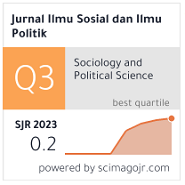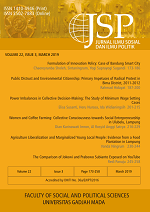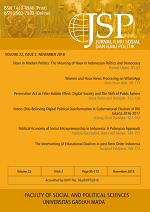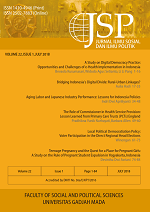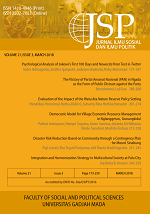Disaster Risk Reduction Based on Community through a Contingency Plan for Mount Sinabung
Puji Lestari(1*), Eko Teguh Paripurno(2), Arif Rianto Budi Nugroho(3)
(1) Universitas Pembangunan Nasional Veteran Yogyakarta
(2) Universitas Pembangunan Nasional Veteran Yogyakarta
(3) Universitas Pembangunan Nasional Veteran Yogyakarta
(*) Corresponding Author
Abstract
The eruption of Mount Sinabung in Karo district of North Sumatera has continued on and off since 2010. A contingency plan is needed to reduce the risk of disaster. The purpose of this research is to find a disaster communication model in community-based disaster risk management through Sinabung Eruption Contingency Plan of Karo Regency, North Sumatera Province. This research applies the concept and models of community-based disaster management. The research objectives are to make a disaster risk management model based on the community as a contingency plan for Sinabung. A qualitative method is used by the researchers to finish this paper. This research is held in risk area of Mount Sinabung, Karo, Sumatera Selatan. The object of this research is the ability of government, non-government, and also society as actors of concept and models of community-based disaster management communication. The researchers analyze the program and the competency of the actor concept and the models of community-based disaster management communication. The result of this research is a disaster communication model in community- based disaster risk management through Sinabung Eruption Contingency Plan.
Keywords
Full Text:
PDFReferences
Afianti, Y. (2008). Focus group discussion sebagai metode pengumpulan data penelitian kualitatif. Keperawatan Indonesia, 12(1), 58–62.
Asteria, D. (2016). Optimalisasi komunikasi bencana di media massa sebagai pendukung manajemen bencana. Jurnal Komunikasi Ikatan Sarjana Komunikasi Indonesia, 1(1), 1-11.
Iguchi, M., Ishihara, K., Surono, & Hendrasto, M. (2011). Learn from 2010 Eruptions at Merapi and Sinabung Volcanoes in Indonesia (54 B ed., pp. 185-194). Kyoto: Disaster Prevention Research Institute, Kyoto University.
Lestari, P., Kusumayudha, S., Paripurno, E., & Jayadianti, H. (2016). Environmental communication model for disaster mitigation of Mount Sinabung Eruption Karo Regency of North Sumatera. iNFORMATION An International Interdisciplinary Journal, 19(9B), 4265-4269. Retrieved from http://eprints.upnyk.ac.id/14491/1/Information%20Journal.pdf
Lestari, P., Sembiring, I. D., Prabowo, A., Wibawa, A., & Hendariningrum, R. (2013). Manajemen komunikasi bencana Merapi 2010 pada saat tanggap darurat. Jurnal Ilmu Komunikasi, 10(2), 173–197. doi: 10.24002/jik. v10i2.350
Nasution, M. S. (2005). Penanggulangan bencana berbasis komunitas: studi kasus kesiapsiagaan bencana berbasis komunitas daerah rawan bencana alam tanah longsor di Desa Kidangpananjung Kecamatan Cililin, Kabupaten Bandung, Jawa Barat. (Unpublished master’s thesis). doi: doi. org/10.1017/CBO9781107415324.004
Presiden Republik Indonesia. (2007). Undang- undang Republik Indonesia Nomor 24 Tahun 2007 tentang Penanggulangan Bencana. Jakarta.
Presiden Republik Indonesia. (2008). PP RI No 21 Tahun 2008. Peraturan Pemerintah. Jakarta.
Putra, A. (2017). Analisis bahaya Gunung Sinabung. Kementerian Energi dan Sumber Daya Mineral, Badan Geologi, Pusat Volkanologi dan Mitigasi Bencana Geologi & UPN Veteran Yogyakarta. Retrieved from http://eprints.upnyk.ac.id/13911/1/ANALISIS BAHAYA GUNUNG SINABUNG APRIL2017.pdf
Sagala, S. A., Situngkir, F., & Wimbardana, R. (2013). Interaksi Aktor dalam rekonstruksi rumah pasca bencana gempa bumi. MIMBAR, Jurnal Sosial dan Pembangunan, 29(2), 217. doi: 10.29313/mimbar.v29i2.397.
Satterthwaite, D. (2011). Editorial: Why is community action needed for disaster risk reduction and climate change adaptation? Environment and Urbanization, 23(2), 339–349. https://doi.org/10.1177/0956247811420009
Shi, P. (2012). On the role of government in integrated disaster risk governance—Based on practices in China. International Journal of Disaster Risk Science, 3(3), 139–146. doi: https://doi.org/10.1007/s13753-012-0014-2
Suri, N. K., & Utara, U. S. (2015). Analisis Kinerja Badan Penanggulangan Bencana Daerah Kabupaten Karo dalam upaya penanggulangan bencana erupsi Gunung Sinabung di Kabupaten Karo. Perspektif, 8(1), 456–477.
Sutawidjaja, I. S. Prambada, O., & Siregar, D. A. (2013). The August 2010 Phreatic Eruption of Mount Sinabung, North Sumatra Letusan Freatik Gunungapi Sinabung Agustus 2010, Sumatra Utara. Indonesian Journal on Geoscience, 8(1), 55–61. doi: 10.17014/ijog. v8i1.155
Tatas, T., Wiguna I. P., Machus, M., Widyastuti, T. D., & Rohman, M. A. (2015). Rencana kontinjensi untuk tanah longsor. Jurnal Aplikasi Teknik Sipil, 13(2), 27-40.
Triutomo, S., Widjaja, B. W., Siswanto, B. P., & Yohannes, K. (2011). Panduan perencanaan kontinjensi menghadapi bencana. Jakarta: Badan Nasional Penanggulangan Bencana (BPBD).
Victoria, L. P. (2002). Community based approaches to disaster mitigation. Regional workshop on best practices in disaster mitigation, 270–314. Retrieved from http://unpan1. un.org/intradoc/groups/public/documents/ APCITY/UNPAN009661.pdf
Wu, T., Takara, K., & Yamashiki, Y. (2012). The vulnerability variation from government roles in disaster risk reduction plans for sediment disasters in Taiwan. Hydrological Processes, 26(16), 2421–2430. https://doi. org/10.1002/hyp.9346
Article Metrics
Refbacks
- There are currently no refbacks.
Copyright (c) 2018 Jurnal Ilmu Sosial dan Ilmu Politik

This work is licensed under a Creative Commons Attribution-NonCommercial-NoDerivatives 4.0 International License.







